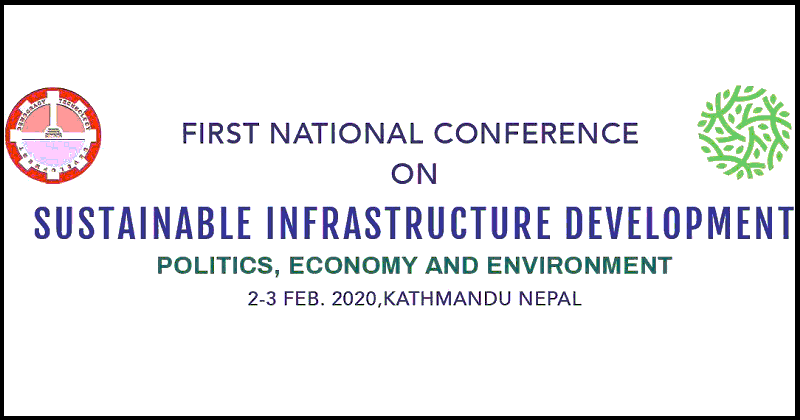
First National Conference: Sustainable Infrastructure Development - Politics, Economy, and Environment
2-3 Feb. 2020, Kathmandu Nepal
A good infrastructure forms the backbone for the development of any country. Over the past two decades, Nepal has made good progress in creating this development infrastructure. Road lengths have increased to 100 thousand Km, Energy production has increased by nearly threefold with an installed capacity of nearly 1300 MW as of mobile phone and internet penetration levels are excessively high. Access to drinking water supply and basic sanitation has crossed the 90 percent mark. But, despite a large number of investments in infrastructure development, the quality of infrastructure provided and the services derived therefrom, remains below desired levels. The Government of Nepal has set a target to graduate from Least Developed Country status to developing country status by 2022 and to a Medium Level income country with near-zero poverty level by 2030.
These aspirations require that investment in infrastructure will significantly rise in the days to come. The need to invest in quality infrastructure to achieve these targets and to contribute to the nation’s economy cannot be undermined but, the political will to drive this surge in investments both in terms of their choice and quality are not seen coming forward. The role of quality infrastructure in the overall development and their impact on social and environmental betterment are still not fully understood and articulated at the political and decision-making levels.
The country needs further open and informed debate regarding the underlying issues for achieving the intended growth in quality of life and the nation's overall economic standing and the strong correlation of these attributes with the quality of infrastructure the nation provides. In this background Center for Democratic Engineers’ (CDEN), has planned to organize a National Level conference in Nepal to support this debate, which will contribute to the overall awareness of the need for quality infrastructure in the country.
The main purpose of the conference is to provide a forum to articulate these issues and to share the best practices in infrastructure development and financing management within and outside the country, develop and refine approaches and models applicable for Nepal including for better planning and implementation. Through this conference, CDEN attempts to interface between political and technical aspects of infrastructure development discourse.
It is expected that the conference will provide an opportunity for national experts to learn from and share experiences with a broad spectrum of international experts who are well-reputed in their respective fields of work. The recommendations of the conference will be broadly shared with the national intellectuals, decision-makers, media, and leaders of political influences, which in turn will create both awareness and willingness to invest in quality infrastructure in Nepal in the next decade.
About Centre for Democratic Engineers' Nepal (CDEN):
Centre for Democratic Engineers' Nepal (CDEN) is an independent Non-Government Organization registered with the government of Nepal under the Organization Registration Act 2034. It was established by engineers who believed in development and democracy as being inseparable elements of society. Its current membership is about 3500 numbers from, various engineering disciplines including Architects, Civil, Electrical, Mechanical, Electronics, and others. CDEN is governed by an elected Executive Council of 25 members, led by the President.
CDEN's mandates include promoting fellowship goodwill and cooperation among the Nepalese engineers, safeguarding their rights and interests and contributing to the road map for a prosperous Nepal through enhancement of skills, capacity, and efficiency of engineers in the country. Since its establishment in 2009, the Centre has dedicated its activities to generate and disseminate knowledge on different contemporary issues through researches, conferences, and seminars.
CDEN works with the local communities as well as with the different organizations at local, national, regional and international levels. The overarching question that guides CDEN’s activities is finding relationships between development and democracy, whereby a more democratic society can provide better, more efficient and more sustainable infrastructure in the country and vice versa.
The goal of the Conference:
The main goal of this conference is to help participants develop deeper understanding the issues on the need for sustainable and resilient infrastructure and its relationship with political issues like justice, equity, freedom; economic issues like growth efficiency and sustainability, and environmental issues including climate change and disaster along with climate change resilient infrastructure.
Conference Objectives:
The main objective of the Conference is to bring all stakeholders in one place to discuss and brainstorm collectively on diverse issues related to infrastructure development, climate change, disaster, transport and urban development, water and sanitation, and information communication technology system in Nepal and develop consensus on the need of collaborative efforts among various line agencies including politics for future course of action. The specific objectives include:
- Assessment of how politics and infrastructure development affects the economy and environment
- Understand the need for capacity development, skills, and knowledge promotion
- Enhance networking among the professionals working within and outside the country
Target Participants:
The conference targets the representative from multi-sectoral agencies that are directly and indirectly involved in infrastructure development who have to deal with the diverse issues and those who are and who need to be sensitized about underlying issues of infrastructure development. The participants in the conference are Engineers, Planners, development partners, decision-makers from different government institutions, representatives from bilateral and multilateral development partners, university faculties, research scholars, students, contractors, private consultants, policymakers, and local community leaders, representative from international governmental and non-governmental organization, NGOs, civil societies and media.
Duration of the Program:
February 2 & 3, 2020 (2 Days)
Important dates:
- Submission of Abstracts: Jan 10, 2020
- Notification for the Acceptance of Abstract: Jan 17, 2020
- Pre-Registration (with early bird discount of 25%): Jan 25, 2020
- Submission of Full Papers with presentation slides: Jan 25, 2020




